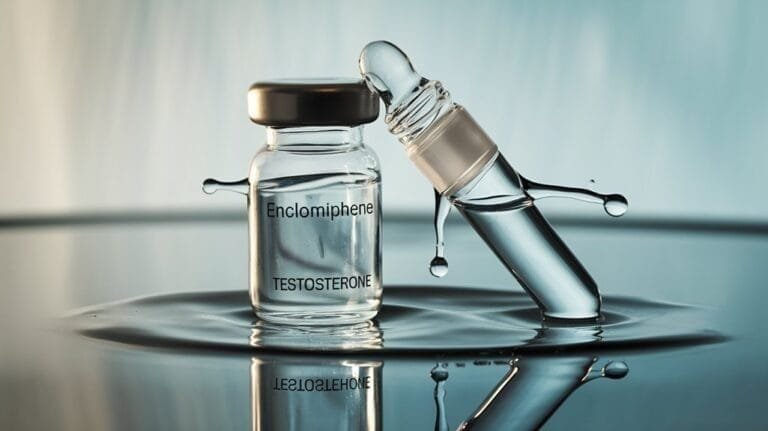Enclomiphene effectively boosts testosterone levels while preserving sperm production in men with secondary hypogonadism. It blocks estrogen receptors, enhancing luteinizing hormone and follicle-stimulating hormone secretion, which leads to increased testosterone from the testes. Unlike traditional testosterone replacement therapies, enclomiphene supports fertility by maintaining normal sperm counts. With a favorable side effects profile, it shows promise in managing hormonal imbalances. Explore further to uncover clinical studies and insights on its potential benefits and future applications.
Key Takeaways
- Enclomiphene effectively increases total testosterone levels through the modulation of the hypothalamic-pituitary-gonadal axis within 14 days of treatment.
- Clinical trials show 63.5% of men maintain normal sperm concentrations after 16 weeks of enclomiphene therapy, preserving fertility.
- Enclomiphene presents a favorable side effects profile, with fewer adverse effects compared to synthetic hormone therapies like TRT and clomiphene.
- Regular monitoring is recommended due to potential mood changes and elevated estradiol levels during enclomiphene treatment.
- Future studies may explore enclomiphene's role in hormone replacement therapy and its potential benefits in female infertility and PCOS management.
Mechanism of Action

When you explore the mechanism of action of enclomiphene, you'll find that it primarily blocks estrogen receptors in the brain, particularly in the hypothalamus.
By preventing estrogen from binding to these receptors, enclomiphene disrupts the feedback regulation that typically inhibits gonadotropin-releasing hormone (GnRH) secretion. This disruption triggers an increase in GnRH, prompting the pituitary gland to release elevated levels of luteinizing hormone (LH) and follicle-stimulating hormone (FSH).
Higher LH stimulates Leydig cells in the testes to produce more testosterone, while FSH supports sperm production, vital for maintaining fertility. This enhanced testosterone production is crucial not only for improving libido and energy levels but also for supporting overall male reproductive health.
Efficacy in Increasing Testosterone
Enclomiphene's ability to effectively modulate the hypothalamic-pituitary-gonadal (HPG) axis directly translates to its efficacy in increasing testosterone levels.
This treatment stimulates endogenous testosterone production, leading to a significant dose-dependent rise in total testosterone (TT) within 14 days, especially for those starting below 300 ng/dL. After two weeks, TT stabilizes at about 450 ng/dL, maintaining levels within a desirable range of 400 to 700 ng/dL.
Importantly, enclomiphene consistently enhances free testosterone levels more effectively than topical testosterone therapy, avoiding the supraphysiologic increases associated with the latter. Additionally, this blockade of estrogen receptors in the brain increases the activity of the pituitary gland, resulting in elevated luteinizing hormone (LH) and follicle-stimulating hormone (FSH) levels.
Impact on LH and FSH

When you consider the impact of enclomiphene on LH and FSH levels, you'll notice significant increases in both hormones. Elevated LH not only stimulates testosterone production but also supports overall reproductive health, while higher FSH levels enhance spermatogenesis. Enclomiphene therapy is designed to maintain endogenous testosterone production, which is crucial for long-term hormonal balance. Understanding these hormonal changes is essential for evaluating the long-term benefits of enclomiphene therapy.
LH Level Increases
As enclomiphene citrate works to increase LH levels, it plays an essential role in regulating the hypothalamic-pituitary-gonadal (HPG) axis and stimulating natural testosterone production. This selective estrogen receptor modulator (SERM) achieves hormonal balance by blocking estrogen receptors in the hypothalamus, allowing for LH fluctuations that ultimately enhance testosterone synthesis.
| Mechanism | Effect | Clinical Implication |
|---|---|---|
| Blocks estrogen | Increases gonadotropin-releasing hormone (GnRH) | Restores natural testosterone |
| Stimulates LH | Elevates LH levels considerably | Supports sexual function |
| Maintains spermatogenesis | Preserves fertility | Safer compared to testosterone therapy |
| Sustained increase | Long-term hormonal stability | Reduces risk of hypogonadism |
| Dose-dependent | Effectiveness across dosing | Tailored treatment options |
FSH Level Changes
The increase in luteinizing hormone (LH) levels following enclomiphene citrate treatment is accompanied by notable changes in follicle-stimulating hormone (FSH) levels.
You'll notice a marked rise in FSH, with increases of 4.8 and 6.9 mIU/mL in the 12.5-mg and 25-mg dose groups, respectively.
This response is due to enclomiphene citrate blocking estrogen receptors in the pituitary gland, enhancing FSH regulation and LH production.
These hormonal fluctuations are vital for supporting sperm production and testicular growth, without compromising spermatogenesis.
Unlike testosterone replacement therapies, which often inhibit pituitary function, enclomiphene citrate maintains FSH levels, fostering a balanced hormonal environment essential for peak fertility and testes function.
Hormonal Role Significance
Understanding the hormonal role of enclomiphene is important for recognizing its impact on luteinizing hormone (LH) and follicle-stimulating hormone (FSH). By acting as a selective estrogen receptor modulator, enclomiphene blocks estrogen's inhibitory influence on the hypothalamic-pituitary-gonadal (HPG) axis. This enhances gonadotropin-releasing hormone (GnRH) production, subsequently stimulating the pituitary to release more LH and FSH, essential for maintaining hormonal balance.
Elevated LH levels directly boost testosterone production, which can restore normal testosterone levels in hypogonadal men within just 14 days. This regulation of the endocrine functions is particularly significant for men wishing to preserve fertility, as enclomiphene promotes natural hormone production without introducing synthetic alternatives, distinguishing it from traditional testosterone replacement therapies.
Preservation of Sperm Production
While many treatments for low testosterone risk compromising sperm production, enclomiphene citrate stands out by effectively stimulating the hypothalamic-pituitary-testicular axis.
This mechanism boosts LH and FSH release, enhancing testosterone production while preserving sperm quality. Unlike exogenous testosterone, which suppresses endogenous hormonal function and spermatogenesis, enclomiphene maintains normal sperm counts and fertility outcomes.
Clinical trials demonstrate that after 16 weeks, men treated with enclomiphene citrate maintained sperm concentrations within the normal range, with 63.5% achieving ideal levels, considerably outperforming testosterone gel.
The sustained elevation of key hormones aids continuous sperm production, making enclomiphene a favorable option for men aiming to enhance fertility while addressing low testosterone levels.
Comparison With Clomiphene and Other Treatments

When considering enclomiphene versus clomiphene and other treatments, you'll notice notable differences in effectiveness and side effects.
Enclomiphene not only boosts testosterone levels considerably but does so with fewer adverse effects, making it a preferable option for many.
This comparison highlights enclomiphene's role in maintaining natural testosterone production while minimizing risks associated with traditional therapies.
Effectiveness of Enclomiphene
Enclomiphene stands out as an effective alternative for raising testosterone levels, especially when compared to clomiphene and testosterone replacement therapy (TRT). This treatment boosts natural testosterone production while maintaining fertility, a significant factor highlighted in patient testimonials and real-world applications.
| Comparison | Enclomiphene | Clomiphene/ TRT |
|---|---|---|
| Natural Production | Promotes own testosterone | Provides synthetic hormone |
| Fertility Maintenance | Retains fertility | Can cause fertility issues |
| Side Effects Profile | Fewer adverse effects | More potential side effects |
Studies reveal enclomiphene effectively raises testosterone in as little as 14 days, with lasting effects. By triggering LH and FSH, it supports the body's hormonal balance, making enclomiphene a preferred choice for many patients.
Side Effects Comparison
Compared to clomiphene and testosterone replacement therapy (TRT), enclomiphene offers a considerably more favorable side effects profile.
The incidence of adverse effects like headaches, nausea, and fatigue is markedly lower with enclomiphene, which can be attributed to its distinct dosage and mechanism of action. Unlike clomiphene, enclomiphene doesn't lead to emotional dysregulation, testicular degeneration, or increased estradiol levels.
In addition, TRT often results in complications such as testicular shrinkage and cardiovascular issues, which are absent with enclomiphene.
Long-term effects of enclomiphene use also show promise in maintaining fertility and sperm concentration, a vital factor for those concerned about reproductive health.
Safety and Side Effects
While considering enclomiphene therapy, it's important to be aware of the potential safety concerns and side effects associated with its use.
The safety profiles indicate that common side effects include headache, nausea, and hot flush, affecting 1.6%, 1.0%, and 1.1% of patients, respectively. Serious side effects like deep vein thrombosis and pulmonary embolism, though rare, have been reported, particularly in those with pre-existing risks.
Long-term monitoring is vital as mood changes and elevated estradiol levels can arise, leading to irritability and gynecomastia. Additionally, patients with a history of blood clots, cardiovascular issues, or liver function concerns should exercise caution.
Regular assessments guarantee you identify any adverse effects early on, safeguarding your well-being during treatment.
Clinical Studies and Results

The growing body of research on enclomiphene therapy highlights its efficacy and safety in treating secondary hypogonadism.
Clinical studies reveal that enclomiphene citrate considerably increases total testosterone levels, comparable to topical testosterone, while preserving sperm concentration and other semen parameters. This is essential for patient selection, particularly for those concerned about fertility, as other treatments negatively impact sperm count.
The therapy also yields favorable lipid profiles, reducing total cholesterol and LDL levels.
With proven hormonal benefits and minimal side effects, enclomiphene demonstrates strong clinical implications for managing secondary hypogonadism.
As you consider treatment options, understanding these results can guide informed decisions and optimize outcomes for patients in this demographic.
Future Directions in Enclomiphene Research
Building on the promising findings from clinical studies, future research on enclomiphene aims to expand its therapeutic applications and optimize its use. Key focus areas include:
- Hormone Replacement Therapy (HRT): Exploring enclomiphene as an alternative for both men and women to modulate estrogen and testosterone levels effectively.
- Combination Therapies: Investigating the synergistic effects of enclomiphene combined with traditional testosterone replacement therapy to enhance safety and efficacy while preserving fertility.
- Female Infertility and PCOS Treatment: Evaluating enclomiphene's potential in managing ovulatory dysfunction and hormonal imbalances in women.
These future applications highlight enclomiphene's versatility and potential significance in clinical practice, warranting ongoing investigation to maximize its benefits while ensuring patient safety.
Frequently Asked Questions
How Long Does Enclomiphene Take to Show Effects?
Enclomiphene's effect timeline generally shows significant results within two weeks, but individual factors like baseline testosterone levels can influence this. Monitoring these variables helps you understand when to expect noticeable improvements in your testosterone levels.
Can Enclomiphene Be Used for Women?
Can enclomiphene be used for women? Absolutely. It offers benefits like increased energy and improved ovulation. Yet, be aware of potential side effects, including mood swings and headaches; regular monitoring is essential to mitigate risks effectively.
Are There Dietary Restrictions While Taking Enclomiphene?
When taking Enclomiphene, you should make dietary changes by focusing on whole foods and protein. Consider nutritional supplements to enhance your diet while avoiding processed foods, excess salt, and alcohol for best results.
Is Enclomiphene Suitable for Older Men?
Yes, enclomiphene's benefits make it suitable for aging men. It stimulates natural testosterone production without suppressing fertility or causing testicular shrinkage, offering a safer alternative to traditional testosterone replacement therapies.
What Should I Do if I Miss a Dose?
If you miss a dose, take it as soon as you remember, unless it's nearly time for the next one. Consistency in your dosage is essential, so avoid double doses and consider dosage adjustments if needed.






